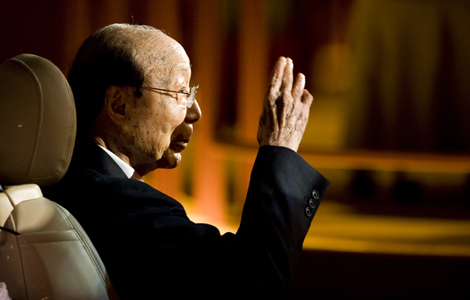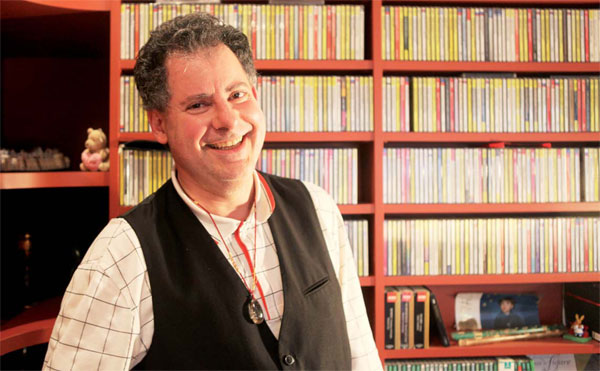Like father, like son
Updated: 2014-01-10 10:20
By Fu Jing (China Daily Europe)
|
|||||||||||
|
Eric Lederhandler says it is important for China to find a balance between Western influences and maintain its traditional values. Fu Jing / China Daily |
Belgian conductor is determined to introduce the pleasures of Western classical music to more people in his adopted second motherland
Belgian orchestra conductor Eric Lederhandler is following his energetic father in fostering friendship between China and Belgium.
Eric's father, Henri Lederhandler, began using his business acumen in the 1960s, when there was little contact between Western countries and China, to foster relations between the new republic and his native Belgium.
Now, Eric uses his concert tours to China to deepen those relations.
As the son of one of the most important founders of the modern China-Belgium relationship, Eric says he has more close friends in China than in his own country.
Lederhandler can still remember his first trip to the "second motherland" of his father in 1993. He was invited to Beijing to attend the 30th anniversary celebration of the founding of his father's import-export corporation.
Though he grew up with Chinese diplomats, politicians and businessmen visiting his home, that trip was still a culture shock for the 28-year-old Belgian.
"I was shocked by the difference, the construction everywhere, the infrastructure and the way of life," recalls the now 48-year-old conductor, as he relaxes in his house in Wemmel, on the outskirts of Brussels, which is decorated with many Chinese souvenirs.
Ten years later, he was invited to revisit Beijing to conduct the Chinese National Symphony Orchestra. On his earlier trip, the city was full of bicycles. In 2003, it was completely different. There were fewer bikes and many more cars.
"In 1993, my father's office in downtown Beijing was surrounded by empty lots," Lederhandler says. "Now, there are many more buildings there and Beijing is much more modern. Some areas even look like America."
As a conductor working with many Chinese orchestras, such as the Central Philharmonic Orchestra and the national, Lederhandler has seen how these orchestras operate.
"Orchestras in Shanghai and Beijing work more like the way we do in the West, from their organization, their mental approach to the way they handle the artists," he says. He thinks provincial orchestras operate in a more traditional, casual and flexible way.
"Our ideas about organization are totally different. The schedule for a European orchestra is planned a year ahead."
The Chinese are prone to changing plans at short notice, he says. It has taken Lederhandler 10 years to get used to this approach but eventually he has grown to like it.
Another thing that has impressed him is the different energy shown by artists between rehearsals and concerts.
"At rehearsals, I have to try hard to get the musicians' attention, to get them to work together, while at concerts everyone shows total concentration." "The difference is so great it's amazing."
At the same time, he regrets the fact that few Chinese fully appreciate Western classical music, while most are not educated in it.
"In such a huge city like Beijing, where more than 20 million people live, it's still hard to attract enough people to fill a venue, even when a concert is held in the Forbidden City with US conductors."
Expensive ticket prices in China may be another reason why audience numbers are smaller than in Europe. However, Lederhandler says lower ticket prices do not necessarily lead to bigger audiences. The problem is more about introducing people to Western classical music.
Though he can always feel the audience's appreciation, he says he can be distracted by the noise of people talking, which often happens at concerts in China. However, he also recalls having a totally silent audience during a passionate Beethoven symphony in which the listeners did not need to be so serious.
"People should just react in line with their own emotions and feelings," he says. "You should not think too much about it. There's no need to act like professors."
Having conducted and given masterclasses in cities such as Nanjing, Beijing, Xi'an, Chengdu and Shanghai as well as living in China for quite a while, Lederhandler thinks the challenge China faces now is to find a balance in its development between Eastern and Western influences and to keep certain traditional values. "Knowledge of and respect for history are essential," he says.
Lederhandler likes to share his experience with young people. He believes young contemporary Chinese are sometimes confused by the combination of tradition inherited from their parents and what they see from the West on the Internet and TV. "This contradiction should be managed," he says.
He is confused about the sudden change in people's ways of dressing, the hair-dying and the fanaticism for fashion in China. "Real freedom does not come from material progress but from values inside people."
He is also concerned about corruption in China. "In the cultural sector, it's very bad," he says dejectedly. "People fight not for money but just for ego."
Growing up in downtown Brussels and moving to Wemmel on the city's outskirts when he was 17, Lederhandler considers himself a true child of Brussels. Due to the nature of his father's work, he grew up having easy access to Chinese culture and people.
His perception of the Chinese: "They have weaknesses that come from their great achievements and strengths that come from their weaknesses."
As a conductor who gives 10 to 12 concerts in China every year, Lederhandler leads a more varied life that those who go to an office every day would envy. But that life can be complicated.
"You have to be prepared because you know sometimes it's like you're naked in front of 90 people," he jokes. "You have to be in good condition both physically and mentally."
Half of a conductor's job is to manage the music and the musicians' technique, and the other half is dealing with people's personalities. "You get surprises all the time."
At the Royal Conservatory of Brussels, Lederhandler completed a diploma in choir-conducting and later benefited from attending orchestra rehearsals conducted by two masters, Frank Shipway from Britain and Yuri Simonov from Russia.
"After all, conducting is not just theory," he says. "It's important to watch a good conductor, the way he takes his orchestra in hand, the way he organizes things, the way he reveals his knowledge to people."
He recognizes that in China old records that seem old-fashioned to Westerners are popular. To him, they represent the essence of music. "Fifty or 60 years ago, performers played with their emotions, not their minds or their intelligence."
He thinks conductors from the last century worked very simply, allowing musicians to play with feeling and natural energy. "Now, you have to be good-looking. They conduct shows and ballets now."
Lederhandler believes there is a barrier between Chinese people and Westerners because of cultural differences and the way the Chinese approach relationships.
"When you go a little behind this wall, you'll get the trust you won't get here in Brussels. In China people happily share their phone numbers.
"Actually I have more close friends in China than here, and they come from different generations. China is definitely a motherland."
His father, Henri, helped found the Belgium-China Friendship Association, which acted as the first bridge connecting the countries.
This was one of the reasons why Henri was visited by Premier Li Keqiang at his home in Wemmel in May 2012. His meetings with great minds like Mao Zedong, Zhou Enlai and Wu Xueqian in the 1950s and 60s in Europe and China helped lay the foundation of that later friendship between the two countries.
Eric Lederhandler thinks his father became involved in politics, business and friendship with the Chinese at the same time. "Though now it doesn't seem that unusual, in his time it meant a lot. He was a generous man who could make the buyer and the seller happy in an honest way. What he did was a great achievement."
Inspired by his father, Lederhandler believes his job as a conductor is to try to bring knowledge of Western music to China.
"I was lucky to have two great masters who transferred their knowledge to me, and I'm happy to share it with my Chinese friends," says the cultural messenger. "To learn how to play music is to learn a way of life."
Li Xiaofei contributed to this story.
fujing@chinadaily.com.cn
(China Daily European Weekly 01/10/2014 page28)
Today's Top News
At least 16 dead in E China factory fire
Hollande responds to affairs reports
Li offers Bulgaria help with big projects
Xi calls for reform to fight graft
China, Italy agree to boost co-op
S. China Sea rules no threat to peace
Park urges Japan to face history
Man says loss of face pushed him to kill six
Hot Topics
Lunar probe , China growth forecasts, Emission rules get tougher, China seen through 'colored lens', International board,
Editor's Picks

|

|

|

|

|

|






